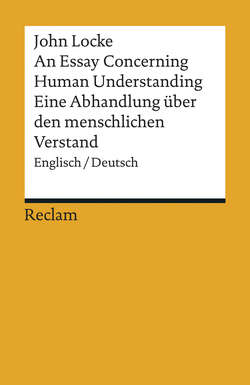Читать книгу An Essay Concerning Human Understanding / Ein Versuch über den menschlichen Verstand. Auswahlausgabe - John Locke - Страница 21
На сайте Литреса книга снята с продажи.
[166]CHAPTER XI
ОглавлениеOf Discerning, and other Operations of the Mind
§ 1. ANOTHER Faculty, we may take notice of in our Minds, is that of Discerning and distinguishing between the several Ideas it has. It is not enough to have a confused Perception of something in general: Unless the Mind had a distinct Perception of different Objects, and their qualities, it would be capable of very little Knowledge […].
[…]
§ 3. To the well distinguishing our Ideas, it chiefly contributes, that they be clear and determinate: And when they are so, it will not breed any confusion or mistake about them, though the Senses should (as sometimes they do) convey them from the same Object differently, on different occasions, and so seem to err. For though a Man in a Fever should from Sugar have a bitter taste, which at another time would produce a sweet one; yet the Idea of Bitter in that Man’s Mind, would be as clear and distinct from the Idea of Sweet, as if he had tasted only Gall. […]
§ 4. The COMPARING them one with another, in respect of Extent, Degrees, Time, Place, or any other Circumstances, is another operation of the Mind about its Ideas, and is that upon which depends all that large tribe of Ideas, comprehended under Relation; which of how vast an extent it is, I shall have occasion to consider hereafter.
[…]
§ 6. The next Operation we may observe in the Mind about its Ideas, is COMPOSITION; whereby it puts together several of those simple ones it has received from Sensation and Reflection, and combines them into complex ones. Under this [168]of Composition, may be reckon’d also that of ENLARGING; wherein though the Composition does not so much appear as in more complex ones, yet it is nevertheless a putting several Ideas together, though of the same kind. Thus by adding several Unites together, we make the Idea of a dozen; and putting together the repeated Ideas of several Perches, we frame that of a Furlong.
[…]
§ 8. When Children have, by repeated Sensations, got Ideas fixed in their Memories, they begin, by degrees, to learn the use of Signs. And when they have got the skill to apply the Organs of Speech to the framing of articulate Sounds, they begin to make Use of Words, to signifie their Ideas to others: These verbal Signs they sometimes borrow from others, and sometimes make themselves, as one may observe among the new and unusual Names Children often give to things in their first use of Language.
§ 9. The use of Words then being to stand as outward Marks of our internal Ideas, and those Ideas being taken from particular things, if every particular Idea that we take in, should have a distinct Name, Names must be endless. To prevent this, the Mind makes the particular Ideas, received from particular Objects, to become general; which is done by considering them as they are in the Mind such Appearances, separate from all other Existences, and the circumstances of real Existence, as Time, Place, or any other concomitant Ideas. This is called ABSTRACTION, whereby Ideas taken from particular Beings, become general Representatives of all of the [170]same kind; and their Names general Names, applicable to whatever exists conformable to such abstract Ideas. Such precise, naked Appearances in the Mind, without considering, how, whence, or with what others they came there, the Understanding lays up (with Names commonly annexed to them) as the Standards to rank real Existences into sorts, as they agree with these Patterns, and to denominate them accordingly. Thus the same Colour being observed to day in Chalk or Snow, which the Mind yesterday received from milk, it considers that appearance alone, makes it a representative of all of that kind; and having given it the name Whiteness, it by that sound signifies the same quality wheresoever to be imagin’d or met with; and thus Universals, whether Ideas or Terms, are made.
§ 10. If it may be doubted, Whether Beasts compound and enlarge their Ideas that way, to any degree: This, I think, I may be positive in, That the power of Abstracting is not at all in them; and that the having of general Ideas, is that which puts a perfect distinction betwixt Man and Brutes; and is an Excellency which the Faculties of Brutes do by no means attain to. For it is evident, we observe no foot-steps in them, of making use of general signs for universal Ideas; from which we have reason to imagine, that they have not the faculty of abstracting, or making general Ideas, since they have no use of Words, or any other general Signs.
[…]
